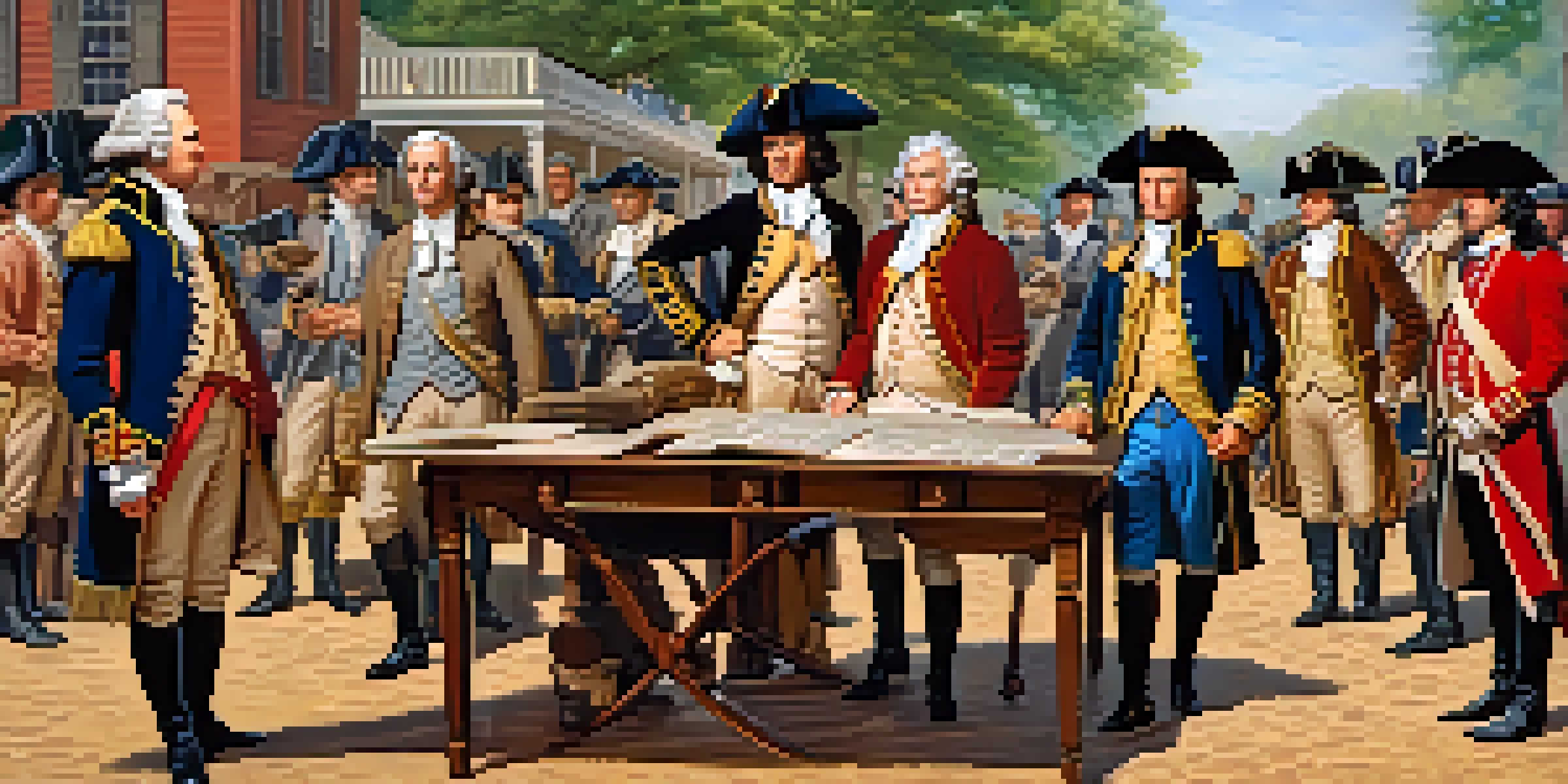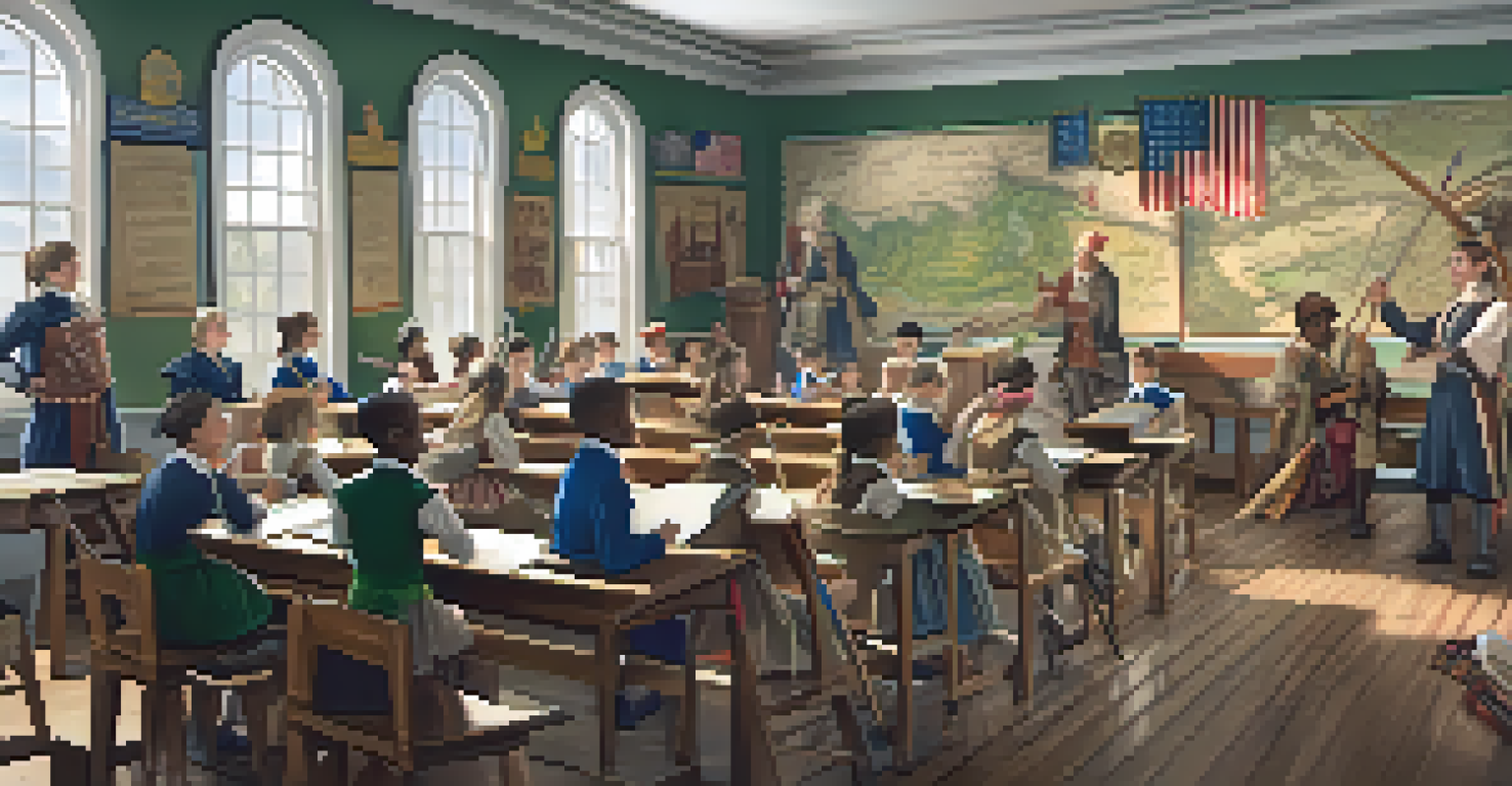Charlotte's Revolutionary War Influence on Southern Heritage

Charlotte: A Strategic Hub During the Revolution
During the Revolutionary War, Charlotte emerged as a crucial strategic hub in the South. This bustling town became a meeting point for patriot leaders who were planning their moves against British forces. The city's location made it ideal for coordinating military efforts, ultimately influencing the course of the war in Southern states.
The American Revolution was a beginning, not an end.
In particular, Charlotte's role as a supply center meant that it was vital for the Continental Army. This included the gathering of troops and resources that were necessary to sustain the fight for independence. The community rallied together, showcasing a spirit of cooperation and resilience that became a hallmark of Southern heritage.
The impact of these strategic decisions can still be felt today, as Charlotte's history is woven into the broader narrative of the American Revolution. This legacy continues to foster a sense of pride among residents and serves as a reminder of the sacrifices made for freedom.
Key Battles and Events Shaping Charlotte's Role
Several significant battles took place in and around Charlotte, which helped solidify its reputation as a center for revolutionary activity. The Battle of Charlotte in 1780, although not a large-scale engagement, was pivotal in fostering local support for the Continental Army. This event galvanized residents, encouraging many to take a stand against British rule.

Another notable event was the founding of the Mecklenburg Declaration of Independence, which was claimed to have occurred in 1775. This declaration, though debated, symbolizes the early spirit of rebellion that characterized the area's residents. Such actions showcased the commitment of Charlotteans to the cause of independence.
Charlotte's Strategic War Role
During the Revolutionary War, Charlotte served as a crucial hub for coordinating military efforts and rallying local support for independence.
These battles and events contributed significantly to the narrative of Southern heritage, illustrating how local actions can lead to larger movements. The bravery and determination exhibited by the people of Charlotte resonate through history, reminding us of their crucial role in shaping the Southern identity.
The Influence of Local Leaders and Figures
Charlotte was home to influential figures who played vital roles during the Revolutionary War. Leaders like John McKnitt Alexander and William R. Davie emerged as key proponents of independence and rallied support among their peers. Their efforts helped to unify the community in the fight against British oppression.
History is not a burden on the memory but an illumination of the soul.
These local leaders not only strategized military actions but also inspired their fellow citizens through their speeches and writings. They understood the importance of rallying public sentiment, utilizing their charisma to motivate others to join the cause. Their legacy remains a critical part of Charlotte's history and Southern heritage.
The impact of these figures extended beyond the war itself, shaping the values and principles that would guide future generations. By embodying the spirit of perseverance and commitment to justice, they laid the groundwork for a Southern identity rooted in courage and resilience.
Cultural Reflections: The Legacy of the Revolution
The Revolutionary War left a profound impact on the culture of Charlotte and the surrounding Southern region. It fostered a sense of pride in local history, reflected in the numerous monuments, museums, and commemorative events that celebrate this pivotal time. This cultural heritage serves as a reminder of the sacrifices made by those who fought for independence.
Additionally, the values of liberty and democracy that emerged from the revolution continue to influence Southern culture today. These principles are celebrated in local traditions, festivals, and even in the educational curricula across the region. The revolutionary spirit is embedded in the identity of Charlotte, shaping its future generations.
Influential Local Leaders
Key figures like John McKnitt Alexander and William R. Davie united the community and inspired others to join the fight against British oppression.
As Charlotteans reflect on their history, they often find inspiration in the stories of resilience and bravery from the Revolutionary War. This connection to the past reinforces a collective identity that honors those who contributed to the fight for freedom, ensuring that their legacy endures.
Modern Commemoration of Revolutionary Heritage
Today, Charlotte actively commemorates its Revolutionary War heritage through various events and initiatives. Annual celebrations, such as the Charlotte Independence Day Parade, highlight the city's historical significance while fostering community spirit. These events draw residents together, emphasizing the importance of remembering their roots.
Local museums and historical sites also play a crucial role in preserving this legacy. Institutions like the Charlotte Museum of History provide educational resources and exhibits that explore the region's revolutionary past. This commitment to historical education ensures that future generations appreciate the sacrifices made for their freedom.
Moreover, the city's dedication to honoring its revolutionary heritage reflects a broader trend across the South. Many communities take pride in their history, utilizing it to inform present-day values and foster a sense of belonging among residents.
The Role of Education in Preserving History
Education plays a pivotal role in preserving Charlotte's Revolutionary War history. Schools in the area incorporate local history into their curricula, ensuring that students understand the significance of the events that took place in their own backyards. This emphasis on local history fosters a sense of pride and connection among young learners.
Field trips to historical sites and participation in reenactments allow students to engage with the past in a meaningful way. These immersive experiences not only make history more relatable but also inspire a deeper appreciation for the sacrifices made during the war. By connecting students with their heritage, Charlotte cultivates a generation that values its historical roots.
Cultural Legacy and Education
The impact of the Revolutionary War is celebrated through local traditions and educational initiatives that connect residents with their rich historical heritage.
In this way, education becomes a bridge between the past and future, helping to keep the spirit of the Revolutionary War alive in the hearts of Charlotte residents. As students learn about the struggles and triumphs of their ancestors, they are empowered to carry forward the values of liberty and justice.
Charlotte's Revolutionary War Influence on Southern Identity
Charlotte's influence during the Revolutionary War has become a cornerstone of Southern identity. The bravery of its residents and the strategic importance of the city during this tumultuous time have left an indelible mark on the region's heritage. This connection to the past shapes the values and beliefs of the community today.
The stories of local heroes and events serve as a source of pride for Charlotteans, reinforcing a collective identity rooted in courage and resilience. By celebrating their history, residents foster a sense of belonging that transcends generations. This shared heritage is a powerful unifying force within the community.

Ultimately, Charlotte's role in the Revolutionary War is more than just a historical footnote; it is a vital part of what it means to be Southern. The values, traditions, and stories that stem from this period continue to resonate, ensuring that the spirit of the Revolution lives on in the hearts of its people.